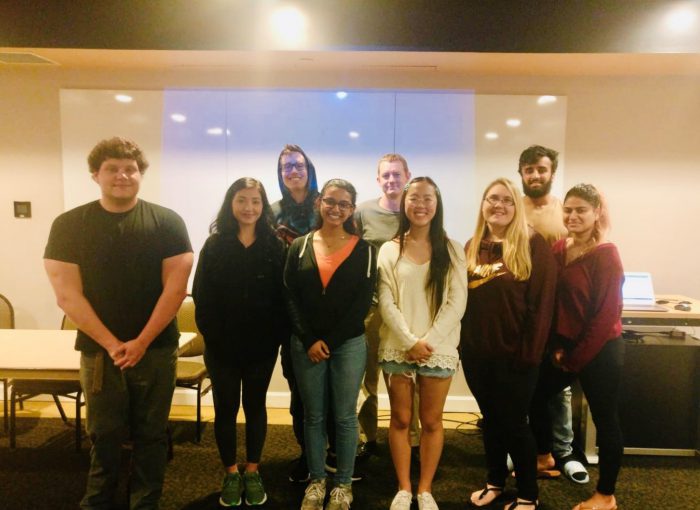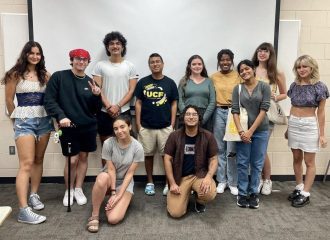by Mandy Morley
Lack of Connection
Since transferring to UCF in the fall of 2017, I’ve been a commuter student. I live an hour from campus and try to be in Orlando as minimal as possible, so I usually schedule all of my classes on either Monday/Wednesday or Tuesday/Thursday at the beginning of each semester.
Only being on campus two days a week limits my sense of connection to my school and fellow classmates. I find it relatively easy to socialize in class about assignments, but when the clock strikes the end of the class period, students scatter their separate ways, and we often tend to get preoccupied with more pressing matters than getting to know our peers. Don’t get me wrong—making friends is great—but when you know you are only going to see your peers for one hour, two days a week, for fifteen weeks, the amount of effort it takes to maintain a friendship can become less enticing. Credit-wise, I’m somewhere between a junior and senior in college and—at least in my experience—everyone in this stage seems to be in his or her own kind of groove, with existing friends and priorities already established.
That being said, it’s definitely not impossible to make new friends in college classes, but being a transfer junior/senior and a commuter student certainly places strains and limitations on potential opportunities to connect. For students in my situation, the day-to-day hour of class time allotted to feel a sense of belonging at school might not be enough.
Popular school events that attract a lot of people provides a plethora of connecting opportunities. Personally, though, I’m not big on sports, and large crowds can be intimidating. Adding that to the fact that I don’t want to drive to campus more days out of the week than I have to (because filling up on gas more than once a week is hardly ideal), weekend football games or parties that are perfect socializing opportunities are not an option for me.
So, What About Clubs?
The thought of joining a club was one that both intrigued and unnerved me, but having a weekly hangout with a consistent group of people sounded like the perfect balance between crowded weekend events and limited class time socialization. Plus, it would give me something to be a part of.
After a year and a half of procrastination, I finally went on Knight Connect and was amazed at the hundreds of clubs that were readily available to join. From religious organizations, to clubs involving writing, marketing, anime, fitness, and even an amateur radio club. There truly does seem to be a club that’s fit for everyone.
Being a commuter student did still limit my options, because I had to find a club that met on one of the two days that I’m on campus, and at a time that I’m not in class. If you are considering joining a club and whether or not you are in a similar situation as me (but especially if you are), I’d advise you to keep your options open. On the Knight Connect site, emails for clubs are provided with the descriptions of the organizations. Choose several different clubs that you are interested in being a part of and email all of them, saying that you are interested in joining and asking when and where they meet each week. This way, you’re more likely to find a club that corresponds with your schedule and less likely to experience the disappointment from emailing one desired club and finding out that they meet at the exact time that you are in your English lecture.
Joining
 Personally, I emailed five different club organizations, and was pleased that even one of them coordinated with my schedule. A few weeks into the spring semester of 2019, I joined A Heartfulness Meditation Experience, not knowing exactly what to expect and having never meditated before in my life. Thankfully, I received a warm welcome from the president of the club, Tulsi Shukla (pictured), and was informed that I didn’t need to be an expert on meditation, but that I only needed to be open-minded and open-hearted.
Personally, I emailed five different club organizations, and was pleased that even one of them coordinated with my schedule. A few weeks into the spring semester of 2019, I joined A Heartfulness Meditation Experience, not knowing exactly what to expect and having never meditated before in my life. Thankfully, I received a warm welcome from the president of the club, Tulsi Shukla (pictured), and was informed that I didn’t need to be an expert on meditation, but that I only needed to be open-minded and open-hearted.
My Place
Heartfulness is a nonprofit organization present in over 130 countries and run completely by volunteers. It’s a specific type of meditation that is a unique practice, with its focus on the inspiration and wisdom that derives from the heart. There are different techniques, including relaxation, meditation, cleaning, and prayer.
Relaxation is not strictly spiritual, but rather a means of relaxing the body in preparation for meditation. It’s usually guided and its goal is to physically relax the body and, in doing so, achieve a calm mental and emotional state.
Meditation is a daily source of clarity, focusing on the presence of divine light in the heart. Not an illuminating kind of light, but rather a feeling of lightness. This is done sitting in a comfortable position, as extra energy and attention paid to a specific posture is not necessary and could even be distracting.
 Cleaning is a method used to rid oneself of any impressions; patterns of emotional reactions, thoughts, and behaviors. This is also done while sitting comfortably and imagining that all of the day’s impressions and complexities are being emitted from one’s back in the form of smoke or vapor.
Cleaning is a method used to rid oneself of any impressions; patterns of emotional reactions, thoughts, and behaviors. This is also done while sitting comfortably and imagining that all of the day’s impressions and complexities are being emitted from one’s back in the form of smoke or vapor.
Prayer, in the Heartfulness sense, is connecting to something higher and should be done twice a day, followed by meditation.
Above is just a quick guide of the essential practices of Heartfulness, but pictured is a book all about Heartfulness that is an easy and insightful read, and you can get it for free by attending one of UCF’s Heartfulness club meetings and requesting it from Tulsi.
UCF’s A Heartfulness Meditation Experience currently meets on Tuesday nights from 7:00-8:00 pm in Cedar Key room 223 on the second floor of the Student Union, and newcomers are always welcome. Heartfulness doesn’t discriminate against age, race, religion, or any other factor, because we all have the common denominator of being human, and we could each benefit from what Heartfulness has to offer.
It might seem contradictory that I previously stressed connecting through socialization, then joined a club where everyone is silently meditating for thirty minutes each meeting. However, there is a strange sense of oneness in meditating around other people, as everyone in the room is striving to attain the same goal. Beyond that, there is socializing before and after the meditation period, and I’ve enjoyed everyone that I have met so far.
For me, joining a club at UCF was and still is about more than just socializing and making friends. It’s about belonging to an organization; being a part of something bigger than weekly classes and more focused than bustling weekend festivities. A Heartfulness Meditation Experience has helped me to become more introspective while also teaching me to be mindful of others, and it has provided more consistency in my school life. UCF used to be just a place that I commuted to, went about my class business, and left. Now, through joining a club, I’m establishing a genuine sense of connection, and my school is finally beginning to feel more like mine.





